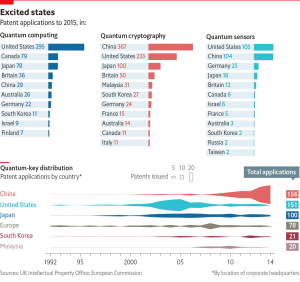Quantum supremacy is coming: What does it have to offer in communication?

IBM Q system One / IBM Twitter
Quantum computing is the now the fever of the mind. Needless to say, there is a huge effort to make powerful quantum computers and this used to be the stuff of university’s physics department. But you can see the potential when you see who is in the business now.[1]
IBM now claims the most powerful quantum computer coming out earlier this month[2], Google goes the furthest in quantum-computer technology and Microsoft has the most comprehensive plan to make the software required.
Nation power joins this competition too. The US government decided to devote US $1.2bn to quantum information science over the next ten years in 2018[3]. Other countries such as China, Britain, Germany, Canada, Japan and so on also made notable effort to the quantum research fields.Tech giants, newly start-ups and public money are all embracing this new technology with great enthusiasm.
Yes, it’s about information.
What can quantum computing do in the field of information?
Information decoding and encrypting
Of course, quantum computing is predicted to play a crucial part in developing new drugs, forecasting weather, building complex multivariable models but it is not hard to see that resources for research on quantum are leaning to quantum cryptography. Quantum technologists from all over the world are patenting their findings more on quantum cryptography.

Why all eye are on quantum computing and especially on quantum cryptography? The answer is simple: it is different. “A quantum computer is not just a more powerful version of our current computers, just like a light bulb is not a more powerful candle. You cannot build a light bulb by building better and better candles.” said Shohini Ghose, a quantum physicist from Wilfrid Laurier University. [4]
Right now, computers depend on bits taking one of two values, 0 or 1. Qubit, the quantum analogue, can be arranged in “state” known as superposition that is best thought as some mixture of both 0 and 1. Thanks to this flexibility, quantum computer can theoretically carry out trillions of calculations per second outshining any supercomputers exist today. Here lies the potential benefits and risks of quantum computing-cracking the code and also encrypting the code(the technique called quantum-key distribution, QKD).
How do quantum computer excels in decoding and encrypting? That is where mathematics and quantum physics coming in and it is another story to tell. Here is the a video explicitly explains how quantum computer break encryption.
How will it change our information privacy?
What I want to address is the changes of information privacy brought by quantum computing. At the moment, the quantum systems are exceptionally fragile. To make them function normally, rigorous physical environment: a degree slightly above absolute zero, strictly controlled stray air molecules and so on, is a must. [5] Under these restrictions, quantum computing is only applicable to nation funding organizations or giant companies. However, as further researches goes, the use of quantum computing might go beyond decoding or encrypting state secrets and financial information and come to connection.

The future of the technology lies in quantum networks-the infrastructure required to connect many senders and receivers. South Korea’s government is funding a 250km link to join existing metro quantum networks, Britain also is going to deploy the connection between cities and China has completed a metro network over 70 square kilometers. [6] Although quantum computer and traditional computer are different in working mechanism, the power of linking computers together should not be underestimated. In the future, we might have quantum distributed computing and quantum cloud computing.
“The quantum internet has the potential to change the way in which people and organizations collaborate and compete, establishing trust while protecting privacy.” says Seth Lloyd, a theorist at the Massachusetts Institute of Technology.
But how is quantum internet going to achieve it?
After the emergence of digital communication networks, our debate around technology and privacy has been transformed. Tectonic shifts in the technical, economic, and policy domains have brought us to a new (privacy) landscape that is more variegated, more dangerous, and more hopeful than before. [7] New technologies, from closed-circuit television cameras to large database, have long complicated privacy practices. (Solove, 2004) [8]
As it could be seen in the contemporary case of social media, such technologies shift the information landscape in ways that call into question cultural assumptions and social norms about sharing, visibility, and the very essence of privacy. [9] Although it is not known that how quantum computing is going to change our privacy practices, one thing we could be sure about is that it will bring up new problems.

Actually, efforts to make sure that quantum computing is going in the right direction are under way. The European Telecommunications Standard Institute is working to define quantum-cryptography standards and hope to create a widely agreed level of security.
Rather than concern too much about quantum computing invading our privacy, I suggest take quantum computing as a new medium which shapes and controls the scale and form of human association and action.[10] Furthermore, the potentials of quantum computing are not even close to fully realized and this create spaces for us to see, explore and discuss.
After all, like it or not, quantum-communication is coming.
Bibliography
[1]How will quantum computing change the world? The Economist. Youtube video. https://www.youtube.com/watch?v=dDOn_n7tNyo&feature=share
[2]Stephen Shankland.IBM’s new 53-qubit quantum computer is its biggest yet. September 18th,2019. Cnet https://www.cnet.com/news/ibm-new-53-qubit-quantum-computer-is-its-biggest-yet/
[3]Jeremy Hsu.The race to develop the world’s best quantum tech. January 9th, 2019. Spectrum https://spectrum.ieee.org/tech-talk/computing/hardware/race-for-the-quantum-prize-rises-to-national-priority
[4]Shohini Ghose. A beginner’s guide to quantum computing. TED Women 2018.https://www.ted.com/talks/shohini_ghose_quantum_computing_explained_in_10_minutes/transcript
[5]Sabine Hossenfelder, a research fellow at the Frankfurt Institute for Advanced Studies. Quantum supremacy is coming. It won’t change the world. August 2nd 2019. The guardian https://www.theguardian.com/technology/2019/aug/02/quantum-supremacy-computers
[6]Here, there and everywhere. Technology Quarterly. The Economist. https://www.economist.com/news/essays/21717782-quantum-technology-beginning-come-its-own
[7]Phillip E. Agre, Marc Rotenberg. <Technology and Privacy: The New Landscape>.The MIT Press, Cambridge, Massachusetts, London, England. Third printing,2001. page 2-3.
[8]Solove DJ(2004) The digital Person: Technology and privacy in the information age. New York: NYU Press.
[9]Marwick, Alice E, and danah boyd. “Networked Privacy: How Teenagers Negotiate Context in Social Media.” New Media & Society 16, no. 7 (November 2014): 1051–67. doi:10.1177/1461444814543995.
[10] Marshall McLuhan 1994. Understanding Media, the extensions of man. The MIT Press, Cambridge, Massachusetts, London, England. Page 9.